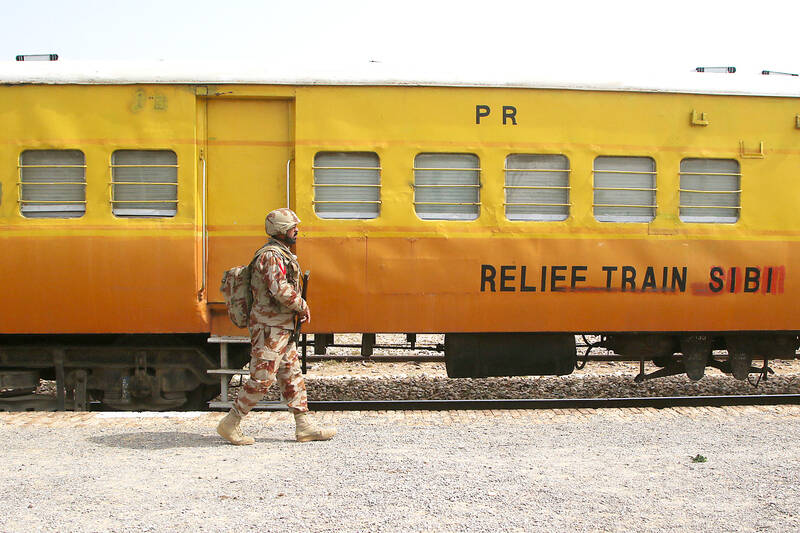Pakistani security forces yesterday exchanged gunfire with hundreds of separatist militants as they sought to free about 300 hostages aboard a train in the country’s rugged southwest, officials said.
Security forces were being cautious, as the hostages were surrounded by militants wearing vests loaded with explosives, officials said.
Pakistani government spokesman Shahid Rind said security forces, who were being backed up by helicopters in the remote region, were being cautious because of the situation.

Photo: Reuters
He described the attack “an act of terrorism.”
At least 27 militants have been killed and security forces rescued more than 150 of the 450 people who were on the train when it was hijacked on Tuesday as it entered a tunnel in Bolan, a district in restive Balochistan Province. It was the first time militants have ever carried out such an attack.
The Baloch Liberation Army (BLA) group has claimed responsibility for the attack, saying it was open to negotiations to swap prisoners. So far, there has been no response or any indication from the Pakistani government to the offer from the insurgents.
The BLA regularly targets Pakistani security forces, but has also in the past attacked civilians, including Chinese working on multibillion-dollar projects related to the China-Pakistan Economic Corridor.
Pakistan hosts thousands of Chinese workers as part of Beijing’s multibillion-dollar Belt and Road Initiative, which is building major infrastructure projects.
The rescued included women and children, while an undisclosed number of security personnel have been killed, said three security officials who spoke on condition of anonymity as they were not authorized to speak to the media.
The train was partially inside the tunnel when the militants blew up the tracks, and immobilized the engine and its nine coaches, they said.
The driver was critically wounded by gunfire and guards aboard the train were attacked, although the officials gave no details about the number of guards that were aboard or if they had been killed.
Rescued passengers were being sent to their hometowns, and the injured were being treated at hospitals at Mach district in Balochistan. Others were taken to Quetta about 100km away.
The train that was traveling from the provincial capital, Quetta, to the northern city of Peshawar when the attack took place.
Balochistan, which borders Iran and Afghanistan, has long been a hot spot for separatist insurgencies, with militants demanding greater autonomy and a larger share of the region’s natural resources.
The BLA, which has waged a years-long insurgency, said the hostages and some captured members of the security forces were being guarded by suicide bombers.
It said that the life of hostages would be at risk if the government does not negotiate.
BLA spokesman Jeeyand Baloch in a statement on Tuesday night said that the group was ready to free passengers if the government agrees to release the group’s jailed militants.
Since then, no government officials have been available for comment. Such demands have been rejected in the past.
Trains in Balochistan typically have security personnel on board as members of the military frequently use trains to travel from Quetta to other parts of the country.
Militants have attacked trains in the past, but have never managed to hijack one.
In November last year, a separatist group carried out a suicide bombing at a train station in Quetta that killed 26 people. Pakistani authorities and analysts estimate that the BLA has about 3,000 fighters.
Oil and mineral-rich Balochistan is Pakistan’s largest and least populated province. It is a hub for the country’s ethnic Baloch minority, whose members say they face discrimination and exploitation by the central government.

PARLIAMENT CHAOS: Police forcibly removed Brazilian Deputy Glauber Braga after he called the legislation part of a ‘coup offensive’ and occupied the speaker’s chair Brazil’s lower house of Congress early yesterday approved a bill that could slash former Brazilian president Jair Bolsonaro’s prison sentence for plotting a coup, after efforts by a lawmaker to disrupt the proceedings sparked chaos in parliament. Bolsonaro has been serving a 27-year term since last month after his conviction for a scheme to stop Brazilian President Luiz Inacio Lula da Silva from taking office after the 2022 election. Lawmakers had been discussing a bill that would significantly reduce sentences for several crimes, including attempting a coup d’etat — opening up the prospect that Bolsonaro, 70, could have his sentence cut to

A powerful magnitude 7.6 earthquake shook Japan’s northeast region late on Monday, prompting tsunami warnings and orders for residents to evacuate. A tsunami as high as three metres (10 feet) could hit Japan’s northeastern coast after an earthquake with an estimated magnitude of 7.6 occurred offshore at 11:15 p.m. (1415 GMT), the Japan Meteorological Agency (JMA) said. Tsunami warnings were issued for the prefectures of Hokkaido, Aomori and Iwate, and a tsunami of 40cm had been observed at Aomori’s Mutsu Ogawara and Hokkaido’s Urakawa ports before midnight, JMA said. The epicentre of the quake was 80 km (50 miles) off the coast of

China yesterday held a low-key memorial ceremony for the 1937 Nanjing Massacre, with Chinese President Xi Jinping (習近平) not attending, despite a diplomatic crisis between Beijing and Tokyo over Taiwan. Beijing has raged at Tokyo since Japanese Prime Minister Sanae Takaichi last month said that a hypothetical Chinese attack on Taiwan could trigger a military response from Japan. China and Japan have long sparred over their painful history. China consistently reminds its people of the 1937 Nanjing Massacre, in which it says Japanese troops killed 300,000 people in what was then its capital. A post-World War II Allied tribunal put the death toll

A passerby could hear the cacophony from miles away in the Argentine capital, the unmistakable sound of 2,397 dogs barking — and breaking the unofficial world record for the largest-ever gathering of golden retrievers. Excitement pulsed through Bosques de Palermo, a sprawling park in Buenos Aires, as golden retriever-owners from all over Argentina transformed the park’s grassy expanse into a sea of bright yellow fur. Dog owners of all ages, their clothes covered in dog hair and stained with slobber, plopped down on picnic blankets with their beloved goldens to take in the surreal sight of so many other, exceptionally similar-looking ones.